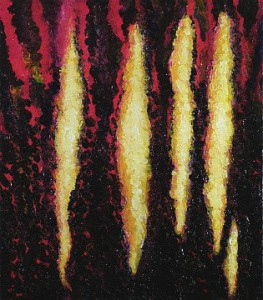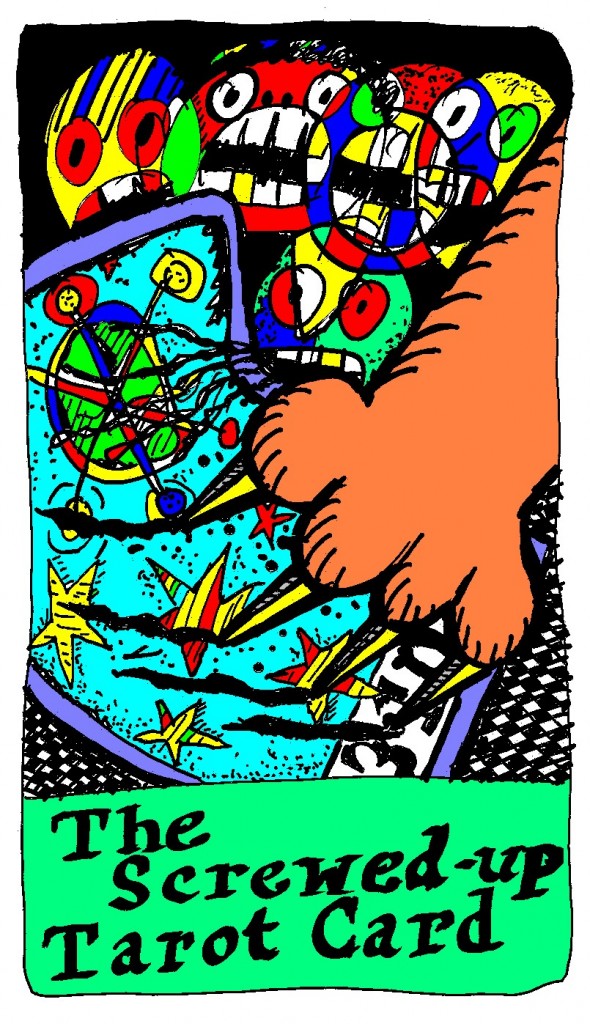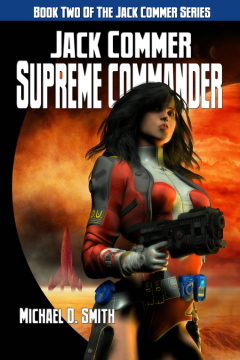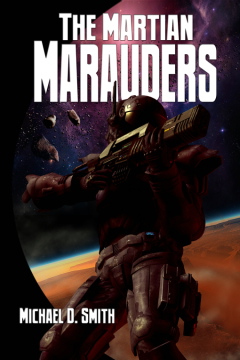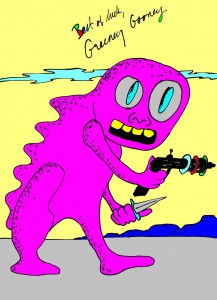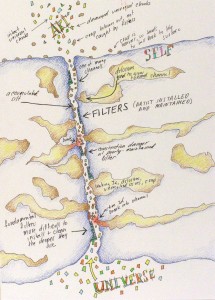 There’s an implied responsibility in being a writer or an artist, fine print in the contract we tend to blow past, so eager we are for the download. And this responsibility is to get objective about what’s coming up from the depths, not to use it for our own aggrandizement. We’re here to channel whatever deep forces may wish to rise, which means channeling them on up past ourselves and on into the world. We do process and interpret the forces as they rush through us, our own life experiences color the results, but trying to use those forces to salve our personal wounds or impress others with our luscious egos simply fails.
There’s an implied responsibility in being a writer or an artist, fine print in the contract we tend to blow past, so eager we are for the download. And this responsibility is to get objective about what’s coming up from the depths, not to use it for our own aggrandizement. We’re here to channel whatever deep forces may wish to rise, which means channeling them on up past ourselves and on into the world. We do process and interpret the forces as they rush through us, our own life experiences color the results, but trying to use those forces to salve our personal wounds or impress others with our luscious egos simply fails.
After struggling with this post for over a year I realized that my initial thoughts seemed to be saying that we’d better control that damn libido before it wrecks our art. I think I was narrowly defining what was permissible to investigate, talking down to writers who feel a need to explore sexuality, obscenity, the dark side, whatever. As if all writing must be tidy and well-controlled. I’m still ambivalent about erotic or romance novels. I just do not understand those genres, don’t read them, but I assume their writers have a legitimate purpose and know what they’re doing–unless, of course, some are in fact succumbing to unresolved libido issues.
I think of libido as the entirety of life force, not just sex. What I mean by leaking libido is unresolved issues that start appearing in our art–seeping into it from the unconscious and usually skewing the results. In writing, examples of leaking libido might include:
- Unreal sexuality–no real emotions, no guilt, reservations, jealousy (or if present, easily dispensed with) exaggerated physical performance, super-sophisticated attitudes, all-too-easy encounters with no repercussions; and birth control, venereal disease, or pregnancy are usually unmentioned.
- Overuse of obscenity.
- Cynicism, suppressed anger, defensiveness, cynicism, obsession.
- Aggression, ego-tripping, bombast, the urge to dominate the reader, displays of cleverness or wit, appearing erudite, above it all, or the final authority on the subject.
- Overdone satire, religious or philosophical obsessions, often clumsily inserted into characters’ speech or breaking into long-winded, meaningless conceptual narrative.
- A lack of self-confidence manifesting itself as writing derivative fluff, using characters or plots from other novels or films, or outright plagiarism. I’m not sure where “fan fiction” comes into play, but I admit I have a pretty low opinion of it to begin with.
- An overall sense of unreality, being unanchored to real human emotions. Tearjerker endings and heavy irony–attempts to impress that don’t ring true.
- Bathos, a wonderful word. Trying to achieve great passion, and failing so pathetically that the reader laughs.
- Complaining, diatribes, blaming other people or institutions for your personal screwups.
- Lying, dishonesty, coolness, covering up in general, all the ways an author can refuse to confront an issue and endlessly talk around it, inability or unwillingness to establish basic trust with the reader.
In general, too much sex, too much anger, too much aggression, too much obsession and ego pressure. There are countless ways to make mistakes in writing, and not all are leaking libido (as, for example, having trouble controlling your exposition in initial chapters). But the lesser items on the above list, like bathos or complaining, nevertheless can be a passive form of aggression. Even boring a reader is aggression.
I could cite examples of novels leaking libido in these various ways, but that would lead down negative alleys and severely lengthen this post; besides, with the exception of fan fiction, I’ve done most of the above myself. Probably most writers have as well, so I’m not trying to be overly judgmental here.
In any case, the result of leaking libido is that the reader is no longer dealing with an attempt at art, at exploration and moving beyond ourselves, but finds him or herself bogged down by the author’s personal issues, often unaware this is happening but nevertheless feeling discomfort with the writing–a basic lack of trust in the author, who is no longer a comrade in the pursuit of the real, but a wounded soul pursuing some therapeutic release.
Is it valid for an author’s personal issues to intrude? Isn’t a lot of great writing suffused with precisely this sort of authorial obsession? Well, yes and no. Sometimes we can learn from an author’s struggles with his or her demons. And sometimes … it’s just gamy and boring, like annoying Internet pop-up ads, or web sites with tantalizing links to paparazzi photos of vapid nude starlets, abruptly breaking into the flow of the meaning you were trying to get at, blowing off whatever energy the artwork had mustered so far.
Libido is true, if nothing else. It certainly can’t be controlled by the ego. But it still may be beneficial to explore what happens with leakage. Because libido is the fuel for art, and pretty hard to make sense of, some of it will probably always keep leaking into our art. Which is why the process is tricky, because we’re supposed to explore those deep unresolved issues. So what happens when it becomes over the top, untrue to life, or just plain nasty? What’s really going on at that point?
The “Core Self” drawing, one of my first blog posts, speaks to this issue. The channels to the depths can also attract unresolved problems into the channel itself, where they can intrude and pollute the universal energies flowing through the channel.
Therapy is one byproduct of good art. But art for the primary purpose of therapy fails as art, though I agree some of it is interesting. Some of it does make a fascinating map of symptoms–even if it lacks a courageous investigation of the roots.
I finally noticed my own overuse of obscenity in my writing, probably an unconscious carryover from my college student days, when we really thought that obscenity as punctuation got down to the grit of real life. In any case I must have been trying to bleed off unresolved anger or aggressive impulses. Eventually I charted four levels of obscenity:
Level 1: None at all.
Level 2: Mild, more or less socially acceptable curses like “damn,” “crap,” “goddamn,” “son of a bitch,” “bastard,” “screw you.”
Level 3: A higher level of frankness in one sense, but easily amenable to leaking libido. At this level the obscenity can start to get used like punctuation as the author’s frustrations just keep coming out in curse after curse. “Shit” and “asshole” belong here. This is an area where some readers really start getting turned off.
Level 4: The standard Anglo-Saxonisms and their endless colorful combinations. Not that we can never go here, but overuse is going out of your way to offend.
It’s one thing if the obscenity comes out of characters’ mouths; it’s a sure sign of leaking libido when the author uses it in his narrative voice, as: “He drove his goddamn car into a tree.” That’s rare, but I’ve seen it in even famous writers.
I realized I wanted only up through Level 2 for all four novels in the Jack Commer, Supreme Commander series, as I wanted them to be more accessible to a wider audience. In the next to last draft of the third novel, Nonprofit Chronowar, I used Ctrl-F to find 90 uses of “shit” or “bullshit,” and 36 of “asshole,” all spoken by my characters. Rereading through the novel as I searched for these words, I realized how much it put me off the story. After changing all instances of these, I found that I needed to reprint 78 pages of the manuscript’s 332!
It was absurdly easy to take out all Level 3. In fact, reaching for alternate words strengthened this novel greatly. When USSF Public Relations Director Robbert Geswindoll shows the video of Joe and Jackie starting to make love, her husband Huey said, in the prior version: “Shit!” Now he says “Damnfire!” which reflects much more his sardonic, distant attitude. Instead of saying that Joe “scared the shit outa me,” Huey now says “scared the bejeezus outa me!” Again more in character. Characters can easily say “Forget it! I won’t do that!” instead of “Bullshit! I won’t do that!” Often the Level 3 word can simply be excised; it literally is punctuation, and again, it often seems more to indicate the author’s personal stress than to contribute anything important.
It was quite an experience to take my novella The First Twenty Steps, which I published on PubIt and amazon.com, down from Level 4 to Level 2. I mean, this is about a motorcycle gang. But I felt the novella was vastly improved.
Overused obscenity might be authorial laziness, suppressed anger, or some self-image of oneself as a revolutionary, no-holds-barred writer. It can be forced into scenes that just would not play out that way in real life, despite the fact that some people do use it as punctuation. Would I say, at a staff meeting, something even as mild as “I don’t give a damn about this database”? Yet in leaking libido mode I might have the character frothing about the databases in full cry Level 4. If intended as outrageous humor, maybe that would work. But chances are I just think I’m adding color to a character by his use of obscenity. In most real situations such language would make other people think the speaker was simply vulgar–even if he did consider himself a passionate revolutionary outside the restrictions of social norms.
You also see such overuse in movies where the obscenities just flow out of actors’ mouths without any real bearing on the story or characters. Often played for laughs, it usually just seems numbly grim after a while. Sometimes the actors’ hearts just don’t seem to be in that dialog, either—but that’s the way the script was written. Sometimes the excuse is that “this is how real people talk.” Well–do they really? This way? All the time?
The last time I read The Brothers Karamazov I noted that the completely corrupt character of Fyodor, the old man, was expertly delineated without the use of a single obscenity across 900 pages. None came from his outrageous lips or from any other character describing him. (At least in English translation!) His murderous, seething son Dmitri never calls him an “asshole”; in fact if he did even once that would ruin the book. That really got me thinking about how I make use of these words in dialog.
I first started hazily forming the concept of leaking libido years ago when I was helping read YA novels in a library acquisition department. Basically, we were screening them for quality as well as sexual content. And I saw that the thirty-something authors, testing the limits of sexual expression in YA format, were endowing their teenage characters with breathtakingly sophisticated sexual awareness and understanding. These books seemed written from the standpoint of “If I only knew in high school what I know now,” and it hit me that the almost obligatory sex scenes, like the overuse of obscenity, were the author’s own libido intruding, a fantasy life finding expression in a novel, maybe even rewriting his or her dismal high school years.
We are the only channel the buried forces have. They’ll use us as long as we more or less get it right–if we get out of the way as much as we can. If we try to take ego-credit for the energies they’re sending through, or if we deliberately warp the energies, the sources of this power will dry up.
Am I seeking to censor sexual content and bad words, or to prohibit psychic investigation of the Shadow? In fact it’s leaking libido that cuts short the discussion, that hijacks the art in service of fueling personal neurosis. Go ahead and experiment–we have to. See what on earth will come through. It’s better to make the experiment and fail, rather than never try. But there’s not much excuse for making the same mistakes over and over, just because those are your comfortable, habitual methods. The unresolved gunk clogging up the art is what we’re here to work on. We’re here to improve the writing far beyond what we can currently imagine it can be.
copyright 2012 by Michael D. Smith

